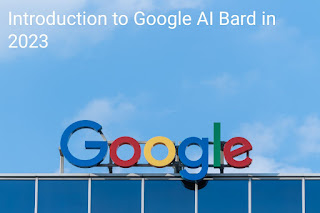A brief discussion on Google AI Bard in 2023
Introduction
In the realm of artificial intelligence, Google has consistently been at the forefront of innovation. From search algorithms to self-driving cars, the tech giant has never shied away from pushing the boundaries of what AI can achieve.
 |
| Introduction to Google AI Bard in 2023 |
One of its most intriguing AI ventures in recent years is the Google AI Bard, a groundbreaking project that aims to revolutionize creative writing. In this article, we will explore the concept of Google's AI Bard, its capabilities, and its potential impact on the world of literature and storytelling.
The Birth of Google AI Bard
Google's foray into creative writing AI began with the realization that artificial intelligence could be harnessed not just for information retrieval or data analysis, but also for the creation of original content.
The project started as an ambitious experiment, seeking to teach a machine to write poetry and prose that could rival human creations.
The foundation of Google AI Bard lies in the neural networks and deep learning techniques that have become synonymous with modern AI.
These networks are fed massive amounts of text from books, poems, articles, and more, enabling the AI to analyze and understand the nuances of language, style, and context.
Capabilities of Google AI Bard
1. Poetry Generation: One of the most captivating features of the AI Bard is its ability to generate poetry. It can emulate the styles of renowned poets, from Shakespearean sonnets to haikus, all with remarkable fluency. The generated verses often evoke emotions and themes that resonate with human readers.
2. Prose Writing: Beyond poetry, Google AI Bard can craft engaging prose. It can write short stories, essays, or even entire novels. The AI can adapt its writing style to match specific genres, such as science fiction, romance, or mystery, making it a versatile tool for authors and storytellers.
3. Personalized Writing: The AI Bard is not limited to imitation. It can be trained to mimic an individual author's style, producing content that feels as if it were penned by that author themselves. This personalized touch opens up new possibilities for collaboration between human writers and AI.
4. Language Translation: Google AI Bard also excels in language translation. It can translate text from one language to another while maintaining the style and tone of the original text. This has the potential to break down language barriers in literature and expand the reach of global literary works.
Impact on the World of Literature
1. Democratizing Creativity: Google AI Bard has the potential to democratize creativity by giving aspiring writers access to a powerful writing companion. It can assist in brainstorming ideas, suggesting plot twists, or even drafting entire chapters, leveling the playing field for newcomers in the literary world.
2. Literary Preservation: The AI Bard can aid in preserving endangered languages and cultures by translating and generating content in languages with limited literary resources. It ensures that the rich tapestry of human culture and storytelling continues to thrive.
3. Collaboration and Inspiration: Established authors can collaborate with Google AI Bard to enhance their productivity and creativity. The AI can serve as a source of inspiration, providing unique perspectives and ideas that authors might not have considered otherwise.
4. Ethical Considerations: However, the rise of AI-generated literature raises ethical questions. Can a machine truly understand the nuances of human emotion and creativity? Can AI-written works be considered genuine art? These questions challenge our perceptions of what it means to create and appreciate literature.
Challenges and Future Developments
Despite its remarkable achievements, Google AI Bard faces several challenges. The AI still struggles with true creativity, often relying on patterns it has learned from existing texts.
In the future, we can expect Google to continue refining its AI Bard, addressing these limitations and potentially creating more advanced versions. The AI could become an indispensable tool for writers, educators, and linguists, offering new perspectives on the art of storytelling.
Conclusion
Google AI Bard represents a significant leap in the capabilities of artificial intelligence, demonstrating that machines can not only understand but also create art in the form of poetry, prose, and translations. Its potential to revolutionize the world of literature and storytelling is undeniable.
While ethical questions persist, there's no denying the profound impact that AI Bard is already having on the way we write, read, and appreciate literature. As it continues to evolve, it will be fascinating to witness how this AI-driven creative revolution unfolds.







0 Comments